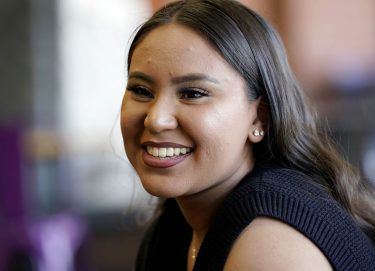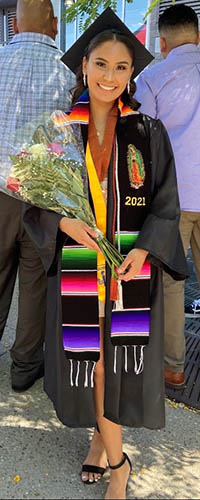
Story by Mike Kilen
Photos by Ralph Freso
GCU News Bureau
Erika Delgado Valadez said her parents, immigrants from Mexico, simply wanted a future for their daughter that included a decent indoor job, out of the heat in the fields where they toiled.
Until the day in 2012 when they were summoned to a meeting at Michael Anderson School in Avondale with many other economically challenged families. It was a day they wouldn’t soon forget.
The Rosztoczy Foundation surprised Valadez and 83 other students by telling them they would pay for their college.
“A lot of us didn’t understand how big it was,” Valadez said.

Ten years later, she is an incoming sophomore at Grand Canyon University, joining four others from the class who attend GCU. They are making good on that promise.
The Rosztoczy Foundation College Promise was a fitting project for an organization founded by the late Ferenc E. Rosztoczy, who lived through World War II in Hungary and the Hungarian Revolution, escaped to the U.S. with no money to his name, yet got a Berkeley education and a doctorate in chemistry. He went on to tremendous business success in farm machinery, dairy products and real estate but never forgot the value of an education.
Even for third graders who had few thoughts of college.
“We wanted to take money off the table early enough so we could change the way they think about education,” said Tom Rosztoczy, Ferenc’s son and a foundation trustee. “If they didn’t think college was a reality, it would be too late.”
By their own measures, it worked. Of the 67 who graduated from high school, 34 are attending college, meeting their goal of 50%, the national average.
“We needed to figure out how to do more of this,” Rosztoczy said.
So this spring, 10 years after its original College Promise, the foundation gave the same promise to 84 third graders at Michael Anderson and 63 third graders at Bernard Black Elementary School, which was chronicled in the Washington Post.
“For me,” Rosztoczy said, “Erika is the poster children of the benefits of this program. She became the valedictorian of her high school class and has a lot on the ball. That’s why you do this – to help these kids reach their potential and think about college differently.”
Through the years, the promise became more real to Valadez. Part of the program required the class to meet standardized test benchmarks by eighth grade.
“Our behavior changed. We tried a lot more in school,” she said. “We were more motivated to reach those goals.”
Many lived within 10 minutes of the school, Valadez said, and urged each other on.
“If we didn’t have the scholarships, a lot of us would have thought we could pass with C's, (as if) it doesn’t really matter. A lot of us had the mentality of just getting a job and not bothering to look at college,” she said.
“But having this promise, we pushed each other to get a degree. We are in this small group that has this opportunity. Let’s make it worthwhile.”

As more than half the group moved up to Desert Edge High School, they grew even closer – and more motivated.
“We want to show that even though we come from low-income households, where half of us receive free and reduced lunch because our parents don’t earn much, we could come from there and graduate,” Valadez said. “It wouldn’t have been realistic without the program.”
She didn’t go far, a half-hour away to the campus of GCU.
“I loved it. It was amazing to meet a lot of people. From Welcome Week the first week, GCU creates all these events so you can meet new people and find the things you are interested in,” Valadez said.
She lived in a residence hall and began taking classes toward a justice studies degree. She wants to start out as a police officer and become enmeshed in the community.
To maintain the scholarship of $120,000 per student, they must maintain a grade-point average of 2.0 or higher and earn at least 12 credits per semester.
Valadez said the foundation regularly checked in with her and sent her positive messages about her progress through her first year at GCU. They were impressed enough to help her attain an internship over the summer.
“That’s why we do this, to help these kids reach their potential and think differently about what they can do,” Rosztoczy said.
After studying the promise’s impact, he said it also lifted the schools and “it had some positive ripple effects on the family.”
Valadez's younger sister now plans on going to college. After all, her older sister said it changed the course of her life.
“It was so shocking. We were in the right place and the right time to be the class that was chosen,” Valadez said. “We were just lucky, as long as we take those opportunities, as long as we take advantage of them, to reach what we want to accomplish.”
Grand Canyon University senior writer Mike Kilen can be reached at [email protected] or at 602-639-6764.
***
Related content:
GCU Today: Stress melts away to joy for SIS scholarship winners
GCU Today: Scholarship winners, families react as dream unfolds
GCU Today: GCU student becomes 1st to intern at appeals court



































































